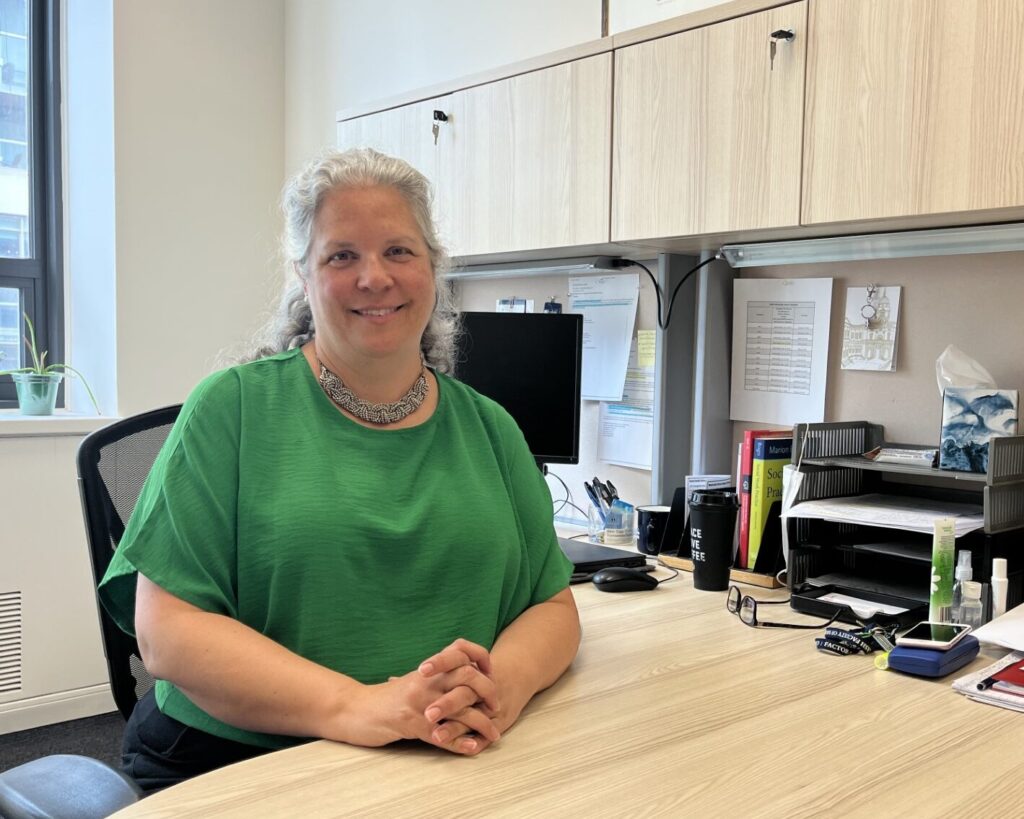Meet FIFSW’s Simulation Coordinator and alumna Megan Davies
Categories: Alumni + Friends, Staff Megan Davies can still recall the anxiety she sometimes experienced in her first practicum placement back when she was a Master of Social Work student at U of T. More than 25 years later, her job is to help current students feel ready for the real world of practice through simulation-based learning.
Megan Davies can still recall the anxiety she sometimes experienced in her first practicum placement back when she was a Master of Social Work student at U of T. More than 25 years later, her job is to help current students feel ready for the real world of practice through simulation-based learning.
“I remember early on not having confidence in my skills,” says Davies, who has been the Simulation Coordinator at the Factor-Inwentash Faculty of Social Work since 2020. “It wasn’t a reflection on the education that I received. It’s just that social work takes a lot of practice.”
During her MSW practicums in child-focused organizations, Davies’ supervisor or other experienced social workers would watch her interaction with clients from behind a two-way mirror. Sometimes she’d wear an earpiece so she could hear and implement their suggestions. In other situations, she would audio record the sessions and play it later for her supervisor. “It was great training, but these methods depended on clients feeling comfortable with being observed or recorded,” she says.
To help further strengthen students’ confidence and competence in clinical practice, the late Professor Marion Bogo began to develop the Toronto Simulation Model in 2002. It was the faculty’s signature pedagogy by 2010 and positioned FIFSW as an international leader in simulation-based training. Larry Enkin’s gifts of $250,000 in 2012 and $1 million in 2014 ensured the simulation program’s sustainability.
The Toronto Simulation Model uses standardized clients – people, sometimes professional actors, who are specially trained to be what’s called Simulated Participants – so there’s no risk to real clients. “Our faculty members create case vignettes, which are outlines of the simulation that include information about the client, their histories and their current concerns,” says Davies. “We also provide additional coaching on the role participants are going to play. But a good Simulant Participant doesn’t just play a role. They have a certain understanding of what skills the student might be working on, and they modulate their behaviour to facilitate that learning.”
Since the scenarios can involve sensitive issues such as trauma, substance abuse and suicide, the faculty relies on Simulated Participants who are familiar with social work and comfortable with the subject matter. Every simulation is observed by course instructors, PhD students or community social workers, who provide feedback to the social work students interviewing the “client”. Students participate as both interviewers and observers, and when it’s over they provide written reflections on the experience and the feedback.
“Students say they feel a sense of being more prepared to work with clients after simulations,” says Davies.
The faculty uses simulation in both teaching and assessment. Students in the two-year Master of Social Work program complete simulations in two intensive courses on social work practice in their first term. This culminates in the Objective Structured Clinical Evaluation (OSCE), a simulation-based assessment originally created for medical students and adapted for social work by Bogo and her team. The OSCE, which Davies coordinates with faculty members, assesses general social work competence in students and helps prepare them for their first practicum.
Students seeking additional opportunities to refine their foundational skills can take part in Practice Fridays, launched in 2015 by Assistant Professor, Teaching Stream Toula Kourgiantakis to provide optional extra simulation-based experience. Davies runs the program and says approximately two-thirds of first-year students sign up for at least one Friday session. “I appreciate the courage it takes for students to come and participate,” says Davies. “We try to create a safe space and emphasize that it’s okay to make mistakes.”
There are also specialized Practice Fridays for second-year MSW students, with themes such as suicide risk assessment and working with families, as well as sessions for MSW students where English is an additional language.
Over her post-MSW career, Davies has honed her skills — and increased her self-assurance — in multiple clinical and administrative roles. Her first position was at Sick Kids Hospital, where she worked for 10 years supporting children and families coping with challenges such as congenital conditions, serious injuries and teen pregnancy. Recognizing the richness of this experience, the Faculty of Social Work recruited her to supervise student practicums.
“I never really left the faculty after that,” says Davies. “I’ve been lucky enough to have a lot of different opportunities here.” She managed a program from 2015 to 2018, for example, where MSW students provided short-term counselling to U of T undergraduate students as their practicum. More recently, Davies advised students enrolled in the MSW in Indigenous Trauma & Resiliency and served as the International Student Coordinator.
Looking ahead, Davies says the faculty hopes to increase the diversity of Simulated Participants and incorporate more simulations with couples, families and individuals across the life span. “All the simulations we offer are aimed at enhancing skills and competencies such as collaborative relationship-building and managing emotions, but they’re equally about increasing students’ confidence,” says Davies. “I remember being a student and having to do things that pushed me outside of my comfort zone, and I know simulations can do this. But they provide such an effective and rewarding learning experience.”
By Megan Easton